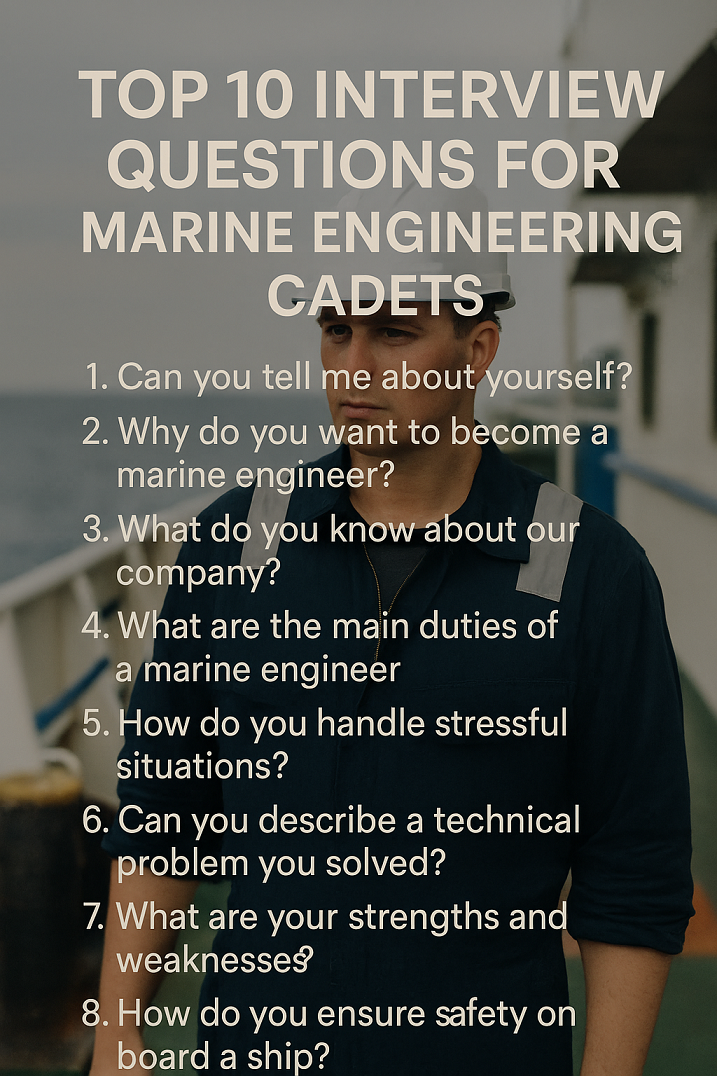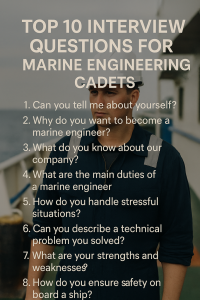Prepare to ace your marine engineering cadetship interview with this guide to the top 10 interview questions. Get expert tips, real-world insights, and proven answers tailored to today’s maritime industry demands.
Why Cadetship Interview Preparation Matters in Modern Maritime Careers
Securing a marine engineering cadetship isn’t just about passing academic tests—it’s about demonstrating that you’re ready to live, learn, and lead aboard a vessel in one of the most demanding environments on Earth.
As the maritime industry evolves with decarbonization targets, digital automation, and stricter safety and compliance frameworks, shipping companies are no longer just looking for strong technical aptitude. They want adaptable, communicative, and emotionally intelligent cadets who can thrive in diverse crews and rapidly changing operational settings.
According to the International Maritime Organization (IMO) and the BIMCO/ICS Seafarer Workforce Report (2021), thousands of new marine engineers are needed globally each year. However, the competition for cadetships remains intense. Understanding what recruiters are looking for—and how to frame your answers—can make the difference between a missed opportunity and a life-changing contract.
This guide breaks down the top 10 most common interview questions for marine engineering cadets, how to answer them effectively, and why they matter to your seafaring future.
Understanding the Interview Landscape
A typical cadetship interview may last between 30 and 60 minutes and often includes a mix of technical questions, behavioral assessments, and industry awareness topics. The format may be one-on-one or panel-based and is increasingly being conducted online.
Many recruiters, including those from Maersk, NYK Line, Chevron, and MOL, align their interview process with STCW competencies, emphasizing safety awareness, teamwork, and decision-making ability.
Top 10 Marine Engineering Cadet Interview Questions (and How to Answer Them)
1. Why do you want to become a marine engineer?
This foundational question tests your motivation, awareness of the role, and long-term commitment.
Effective Answer: Focus on your fascination with marine machinery, interest in international travel, and commitment to a technically demanding career that blends mechanical, electrical, and safety systems.
🛠 Example: “I’ve always been fascinated by large engines and systems. What excites me about marine engineering is the challenge of maintaining critical equipment under real-time pressure while contributing to global trade.”
2. Explain how a marine diesel engine works.
A technical staple. Interviewers want to see if you understand the basic propulsion system.
Key Points to Cover:
-
Four-stroke or two-stroke cycle
-
Fuel injection and combustion
-
Crankshaft and camshaft relationship
-
Lubrication and cooling
💡 Tip: Use simple, structured explanations. Don’t overload with jargon unless you’re asked to elaborate.
3. What is the function of a heat exchanger on a ship?
Demonstrates understanding of thermal systems, which are essential in marine operations.
Solid Answer: “A heat exchanger transfers heat between fluids—usually between a hot fluid like jacket water and a coolant like seawater. It’s critical for maintaining the operating temperature of engines and generators.”
📘 Suggested Reading: Introduction to Marine Engineering by D.A. Taylor
4. How would you respond to an engine room fire during your watch?
This gauges your reaction under stress and familiarity with emergency protocols.
Answer Framework:
-
Raise the alarm
-
Shut fuel valves and ventilation
-
Use fixed firefighting systems (e.g., CO₂ flooding)
-
Follow Muster List protocols
🎓 STCW Connection: Aligns with Basic Training modules in firefighting and personal survival techniques.
5. What are the main types of shipboard pumps and their applications?
Tests both technical depth and understanding of auxiliary systems.
Example:
-
Centrifugal pumps: ballast, bilge, fire
-
Screw pumps: fuel and lube oil
-
Reciprocating pumps: high-pressure applications
📘 Further Study: Marine Auxiliary Machinery by H.D. McGeorge
6. What would you do if you disagreed with your senior officer’s instruction?
This behavioral question probes conflict resolution and teamwork—two critical soft skills.
Recommended Approach:
-
Express respect for authority
-
Mention safety-first mindset
-
Suggest a professional way to clarify doubts or misunderstandings
🎙 Sample: “I would follow the instruction unless it posed an immediate safety risk. I’d respectfully seek clarification afterward to understand the rationale behind the decision.”
7. What do you know about MARPOL and your role in environmental compliance?
Modern seafarers must understand environmental regulations.
Answer Example:
“MARPOL is the International Convention for the Prevention of Pollution from Ships. As a marine engineer, I’d ensure compliance with oil discharge limits, maintain pollution prevention equipment, and log waste management properly in the Oil Record Book.”
📘 IMO Source: MARPOL Overview
8. Describe a time you worked in a team and what role you played.
This soft skills question is often drawn from the STAR method (Situation, Task, Action, Result).
Best Practice: Choose a scenario from school, sports, or volunteer work that highlights leadership, collaboration, or initiative.
9. What safety precautions must be taken before entering an enclosed space?
Vital for hazard awareness. Interviewers want to know if you respect safety culture.
Expected Response:
-
Obtain a permit to work
-
Conduct atmosphere testing (O₂, H₂S, CO)
-
Use ventilation and PPE
-
Assign a standby person
📘 Resource: IMO Guidelines for Enclosed Space Entry (MSC.1/Circ.1401)
10. Where do you see yourself in five years in the maritime industry?
Tests career planning and ambition. Show a clear, achievable trajectory.
Good Response: “In five years, I aim to qualify as a third engineer, build my experience on tankers or LNG vessels, and continue training toward my Class 2 certification.”
Case Studies: Real-World Cadet Interview Outcomes
Case Study: Learning from a Missed Opportunity
A cadet applicant to a large Japanese shipping company failed to articulate the function of a turbocharger. Post-interview, he focused on building a technical concept journal and passed his next cadetship interview with NYK Line.
Case Study: Standing Out Through EQ
An applicant with average academic scores landed a cadetship with Maersk by demonstrating superior communication and conflict-resolution skills during a group interview session. His ability to explain teamwork dynamics during a school project impressed the assessors.
Frequently Asked Questions (FAQ)
Q1: How technical are marine engineering cadet interviews?
A: They balance technical basics with soft skills. You’re not expected to know everything, but foundational understanding is essential.
Q2: What should I study before the interview?
A: Focus on engine components, safety protocols (e.g., enclosed space entry), shipboard systems, and basic maritime regulations like MARPOL and SOLAS.
Q3: How important are soft skills in cadet interviews?
A: Very important. Shipping companies increasingly value teamwork, adaptability, and communication alongside technical know-how.
Q4: What is the STAR method in interviews?
A: STAR stands for Situation, Task, Action, Result. It’s a structured way to answer behavioral questions with real-life examples.
Q5: What attire is suitable for an online cadetship interview?
A: Dress in formal or semi-formal wear. Even for video calls, first impressions matter.
Q6: Can I ask questions during the interview?
A: Yes. Prepare 1–2 thoughtful questions about the company’s training, fleet, or promotion path.
Conclusion
Marine engineering is more than managing machines—it’s about leading under pressure, solving complex problems, and growing into a trusted officer. A well-prepared cadet interview demonstrates your potential to thrive in this challenging yet rewarding career.
Whether you’re applying for a national cadet program, a private shipping company, or an international sponsorship, your success will hinge on a blend of technical readiness and personal integrity.
📘 Want more interview prep guides, STCW resources, or course reviews? Explore MaritimEducation.com and take control of your maritime future.
References
-
International Maritime Organization. (2023). STCW Code and MARPOL Regulations. https://www.imo.org
-
BIMCO/ICS. (2021). Seafarer Workforce Report. https://www.ics-shipping.org
-
H.D. McGeorge. Marine Auxiliary Machinery (7th Edition). Routledge Maritime.
-
D.A. Taylor. Introduction to Marine Engineering (2nd Edition). Butterworth-Heinemann.
-
ISF. (2022). Guidelines for Enclosed Space Entry. IMO MSC.1/Circ.1401. https://www.imo.org


